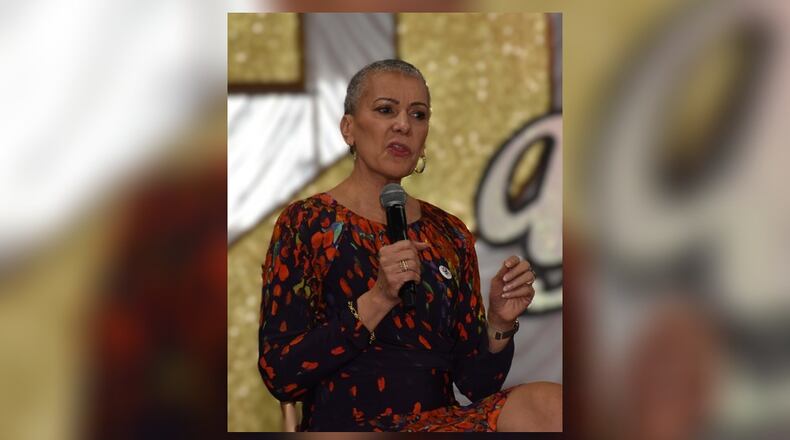The good news, Dr. Sharon Malone told a crowd of more than 500 at the Clark County Fairgrounds, is that if you learn how and when to get screenings — and do what you know you should do — you have a good shot of saving yourself and helping your family and friends do the same.
Malone stopped in Springfield the day before Mother’s Day on a national tour promoting her New York Times bestselling book, “Grown Woman Talk.”
Here, the retired board-certified physician and wife of former U.S. Attorney General Eric Holder, found not just a ready and willing audience at Sisters United for Prevention’s 20th Anniversary Cancer Awareness Luncheon and Fashion Show, but one painfully aware of the damage cancer does to the local Black community.
Proof lay in the fact that 36 of the 59 dining tables for the event were dedicated to those who are living or have died of cancer — and that all 15 models who starred in the style show are survivors.
(The audience also was told that three of the Sisters are currently in treatment.)
Credit: Napoleon Biles
Credit: Napoleon Biles
A call to action
Malone, a certified national menopause practitioner, acknowledged the obstacles that have stood and continue to stand in the way of African Americans getting lifesaving early screenings treatments.
That the zip code of birth is the most reliable predictor of Americans’ long-term health and that some women (and men) can’t get treated for cancer for lack cab fare “really gets me going,” she said.
So does the fact that “we live with a health system in which most people don’t have regular access to doctors” who might guide them.
Nevertheless, Malone said the reality is this: “You’ve got to learn to be the captain of your own ship.”
Getting started
To advance that cause, she whacked away at the reasons and excuses Black women (like all people) give for not taking charge.
1. Volunteer suffering: “We have this notion that we have be strong and suck it up” in the face of discomfort, Malone said. But that gets in the way of accessing care in a timely (and lifesaving) fashion.
2. Doctor bashing: While noting “Black women are less likely to get the (ideal) type of (cancer) care that is recommended,” she underscored the weightier fact that “more women die from no care than bad care.”
3. “Girl, don’t let them cut on you. Then the air will get in there and it’ll spread.” Heads nodded when Malone called those comments “the kinds of things my mother’s generations would say”– with fatal results.
She also addressed “cancer families” like her own, in which her mother died of colon cancer and Malone’s seven siblings were afflicted with 10 breast, prostate and blood cancers.
“Family history … just tells you what you are predisposed to, not what you’re destined to have,” she said.
It also is a reminder to find out when screenings are called for and schedule them.
Credit: Napoleon Biles
Credit: Napoleon Biles
Innovate and educate
When she called for the community to “innovate and educate” against cancer, Malone preached to a choir that has been singing that song in unison for 20 years.
Before guiding Malone through a discussion of her book, emcee Grace Brown, herself a survivor, had recruited a new flock of cancer educators from the audience. asked everyone to wear the decorative Sisters’ button left on the tables in public and, if asked about them, to ask the asker whether he or she is up to date on screenings.
Sisters United also got a shout-out from longtime supporter and Springfield native John Legend, who sent a congratulatory video played during the event.
After praising Sisters United for being “instrumental in keeping the mission that we have alive,“ Pilar Mock, the director of the Mercy Health Springfield Cancer Center, reiterated the importance of grassroots action: “Take from today a great awareness. Talk to your family and your friends. Be an advocate for early detection. It’s so important to save a life.”
What Mom said
And so possible, Malone added.
Colon, breast prostate and lung cancers — which account for 50 percent of all cancers — are either preventable or could be diagnosed early,” she said.
And many can be avoided altogether.
“I want to emphasize the message again and again and again about lifestyle,” she said. “It matters.”
Lung cancer is no longer the leading cause of cancer deaths “not because we have new genes,” she said, but because Black woman have stopped smoking.
Failure to exercise and eat well and limit stress, “don’t just increase your risk of heart disease,” she added, “they increase your risk of cancer.”
The good news, she said, is that “the same things you need to do to decrease risk of heart disease are the things that decrease the risk of cancer and Alzheimer’s.”
And they can lead to a better night’s sleep — yet another thing Moms tell us to do.
About the Author
